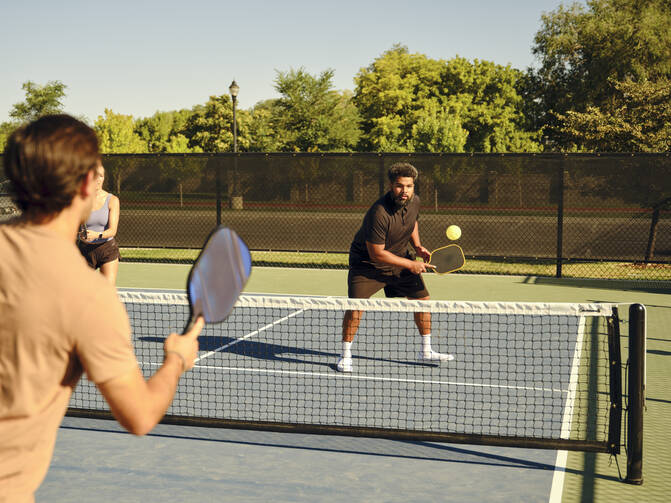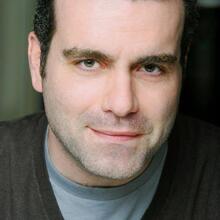During the summer of 2020, in the dog days of the pandemic, I rediscovered the “other” love of my life. Of course, Christ is THE love of my life, and lest you think for even one moment that this will be some salacious bodice-ripping tale in the tradition of “The Thorn Birds,” the great love of my life is not a living person. The love of my life, as for any good red-blooded American male, is a sport. Unlike most red-blooded American males, however, that sport is not football, baseball or basketball. My “suicide blonde,” if you will, is tennis.
I started playing tennis when I was 9 years old, having shown no affinity for the aforementioned ball sports. Inspired by the on-court antics of one John Patrick McEnroe Jr., I picked up my first racquet, a wood Dunlop Maxply I found in the basement of my grandparents’ home. Every day I would go onto the back patio of my parents’ house and, much to their annoyance, proceed to whack a tennis ball over and over against the back wall for hours on end. Soon enough came lessons, tournaments and then the high school team, where I played varsity all four years.
Apparently, while I was rediscovering tennis during the pandemic, the rest of the country was discovering pickleball.
At some point in my teenage years, even after some success on the courts, the reality of my own limitations and the greatness of many of my peers became too obvious to ignore. I resigned myself to a life of not playing professional tennis. I discovered punk rock and its accompanying lifestyle toward the end of my high school career, so any talk about a tennis scholarship was drowned out by the sounds of The Sex Pistols and The Clash.
I would not play tennis again for about 25 years, though I followed the professional tour religiously. Then the pandemic came, and with little for us to do but shelter in place, a Jesuit colleague asked if I played tennis. And so began the rediscovery of my one true love, as I began to play almost daily for three years.
On one of those days, my Jesuit friend Matt and I, seeing that our regular public courts were taken, went to a different park. That is where I first encountered it: pickleball tape. It marked up every tennis court at the park. I was furious.
Over the past year or so, when people have discovered my interest in tennis, they invariably have asked me about pickleball.
I had heard about pickleball and had a general idea of what it was, but I had not paid it much attention. After all, tennis is the king of racquet/paddle sports, the only one whose events are aired regularly on television and whose major championships are global news. Then, almost overnight, it seemed, pickleball began seeping into the public consciousness. Major publications published articles about it, professional events were broadcast on cable television and it was named the “fastest growing sport” in the United States in 2022.
Having only recently realized how much I still loved tennis, I did not want to see some cheap quasi-sport with a playing space called “the kitchen” that uses an off-brand Wiffle ball (already an off-brand baseball itself) and ping-pong paddles the size of John McEnroe’s ego usurp it as America’s favorite racquet/paddle sport.This only fueled the flames of my hostility toward this interloping hybrid of a sport.
The fact that the media and pickleball enthusiasts played up the comparisons with tennis did not help. Pickleball is easier to learn, easier on the body, invites more fellowship: These were the primary reasons laid out for why pickleball was gaining in popularity in the United States over tennis. Apparently, while I was rediscovering tennis during the pandemic, the rest of the country was discovering pickleball.
What is pickleball, anyway?
In all seriousness, pickleball is played with a paddle not dissimilar to those used in table tennis, though with a noticeably larger face. The pickleball court, at 20 by 44 feet, is significantly smaller than tennis’s 36 by 78-foot playing area, with the net (36 inches at the ends and 34 inches in the middle) lower than tennis’s 42-inch ends and 36 inch middle. The ball is very similar in size and appearance to a Wiffle ball, but it has fewer holes and is heavier. Like tennis, players can play as singles or doubles, though pickleball’s much smaller court size better facilitates social interaction.
Over the past year or so, when people have discovered my interest in tennis, they invariably have asked me about pickleball. My response has been an ever-so-diplomatic, “I hate pickleball and never mention it in my presence again.”
But recently, I read an opinion piece in the New York Times that argued for pickleball—with its easy learning curve and inherent social amenability—as a possible remedy for the crisis of male loneliness. The author, Michelle Cottle, suggests that because males prefer activities over conversation as a means of social engagement, pickleball, with its close proximity and low stakes, would serve as an excellent antidote for loneliness.
As a boy playing in tennis tournaments, I became acquaintances with my opponents, but never friends.
This is perhaps when my real true love got the best of me (that’s Jesus, if you were not paying close attention earlier in the article, dear reader). The piece caused me to reflect, in the Ignatian tradition, and I was forced to swallow some hard truths about my “other” one true love. Tennis is a solitary sport. It is also a difficult sport to master; it takes time and it is best to learn when you are a child and have hours to spend by yourself hitting a ball against a wall.
That was my reality as a child: hours and hours of solitude hitting against a backboard. As a boy playing in tournaments, I became acquaintances with my opponents, but never friends; even on my high school team, there was a level of competitiveness between me and my teammates over who was playing first or second (or, heaven forbid, third!) that didn’t allow for much beyond surface-level friendship.
A change of attitude
This past winter, while playing on an indoor court in Omaha, I could not help but notice the chatter and laughter from an adjacent court, which, wouldn’t you know it, had been modified for pickleball players. I was exasperated by the pickleball players’ laughter in the moment; it was disturbing my focus. Then I remembered a conversation I had with my Jesuit friend Matt on the way home from playing tennis one time. (We only really spoke on the drive there and on the drive back.) I explained to him that the enjoyment I received from playing tennis came from playing well, which required me to focus at all times. That amount of concentration also explained the look of utter pain permanently etched on my face on the court. I love tennis, but to me, tennis is serious business.
And so, I begrudgingly (very begrudgingly) am willing to accept pickleball’s growing popularity. I get it. I get why people would find it more appealing than tennis. It not only has a much shorter learning curve, but is much more conducive to fellowship, and even then not just any kind of fellowship: the in-person kind.
Our lack of person-to-person interactions is something that is becoming increasingly notable in our age of technological development. Access to the means of global communication seems to negate the need for physical presence of the other in any situation.
Pickleball allows for a kind of camaraderie on the interpersonal level that individual sports like tennis, swimming and running do not foster. It also is easier to excel at and easier on the body than team sports like football, soccer and basketball.
So if you want to play pickleball, you have my blessing (not the priestly one, the writer/tennis player one). Enjoy! Who knows; I might just give it a shot one of these days, as long as it doesn’t ruin my backhand for tennis.








